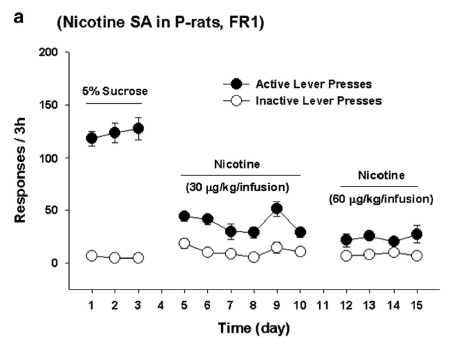Featured Paper of the Month – June 2015
Wang, Xiao-Fei; Bi, Guo-Hua; He, Yi; Yang, Hong-Ju; Gao, Jun-Tao; Okunola-Bakare, Oluyomi M; Slack, Rachel D; Gardner, Eliot L; Xi, Zheng-Xiong; Newman, Amy Hauck
R-modafinil attenuates nicotine-taking and nicotine-seeking behavior in alcohol-preferring rats. Journal Article
In: Neuropsychopharmacology, vol. 40, no. 7, pp. 1762–1771, 2015, ISSN: 1740-634X (Electronic); 0893-133X (Linking).
@article{Wang2015d,
title = {R-modafinil attenuates nicotine-taking and nicotine-seeking behavior in alcohol-preferring rats.},
author = {Xiao-Fei Wang and Guo-Hua Bi and Yi He and Hong-Ju Yang and Jun-Tao Gao and Oluyomi M Okunola-Bakare and Rachel D Slack and Eliot L Gardner and Zheng-Xiong Xi and Amy Hauck Newman},
url = {https://www.ncbi.nlm.nih.gov/pubmed/25613829},
doi = {10.1038/npp.2015.24},
issn = {1740-634X (Electronic); 0893-133X (Linking)},
year = {2015},
date = {2015-01-23},
journal = {Neuropsychopharmacology},
volume = {40},
number = {7},
pages = {1762--1771},
address = {Neuropsychopharmacology Section, Molecular Target and Medications Discovery Branch, National Institute on Drug Abuse, Intramural Research Program, National Institutes of Health, Baltimore, MD, USA.},
abstract = {(+/-)-Modafinil (MOD) is used clinically for the treatment of sleep disorders and has been investigated as a potential medication for the treatment of psychostimulant addiction. However, the therapeutic efficacy of (+/-)-MOD for addiction is inconclusive. Herein we used animal models of self-administration and in vivo microdialysis to study the pharmacological actions of R-modafinil (R-MOD) and S-modafinil (S-MOD) on nicotine-taking and nicotine-seeking behavior, and mechanisms underlying such actions. We found that R-MOD is more potent and effective than S-MOD in attenuating nicotine self-administration in Long-Evans rats. As Long-Evans rats did not show a robust reinstatement response to nicotine, we used alcohol-preferring rats (P-rats) that display much higher reinstatement responses to nicotine than Long-Evans rats. We found that R-MOD significantly inhibited intravenous nicotine self-administration, nicotine-induced reinstatement, and nicotine-associated cue-induced drug-seeking behavior in P-rats. R-MOD alone neither sustained self-administration in P-rats previously self-administering nicotine nor reinstated extinguished nicotine-seeking behavior. The in vivo brain microdialysis assays demonstrated that R-MOD alone produced a slow-onset moderate increase in extracellular DA. Pretreatment with R-MOD dose-dependently blocked nicotine-induced dopamine (DA) release in the nucleus accumbens (NAc) in both naive and nicotine self-administrating rats, suggesting a DA-dependent mechanism underlying mitigation of nicotine's effects. In conclusion, the present findings support further investigation of R-MOD for treatment of nicotine dependence in humans.},
keywords = {},
pubstate = {published},
tppubtype = {article}
}
(+/-)-Modafinil (MOD) is used clinically for the treatment of sleep disorders and has been investigated as a potential medication for the treatment of psychostimulant addiction. However, the therapeutic efficacy of (+/-)-MOD for addiction is inconclusive. Herein we used animal models of self-administration and in vivo microdialysis to study the pharmacological actions of R-modafinil (R-MOD) and S-modafinil (S-MOD) on nicotine-taking and nicotine-seeking behavior, and mechanisms underlying such actions. We found that R-MOD is more potent and effective than S-MOD in attenuating nicotine self-administration in Long-Evans rats. As Long-Evans rats did not show a robust reinstatement response to nicotine, we used alcohol-preferring rats (P-rats) that display much higher reinstatement responses to nicotine than Long-Evans rats. We found that R-MOD significantly inhibited intravenous nicotine self-administration, nicotine-induced reinstatement, and nicotine-associated cue-induced drug-seeking behavior in P-rats. R-MOD alone neither sustained self-administration in P-rats previously self-administering nicotine nor reinstated extinguished nicotine-seeking behavior. The in vivo brain microdialysis assays demonstrated that R-MOD alone produced a slow-onset moderate increase in extracellular DA. Pretreatment with R-MOD dose-dependently blocked nicotine-induced dopamine (DA) release in the nucleus accumbens (NAc) in both naive and nicotine self-administrating rats, suggesting a DA-dependent mechanism underlying mitigation of nicotine's effects. In conclusion, the present findings support further investigation of R-MOD for treatment of nicotine dependence in humans.

